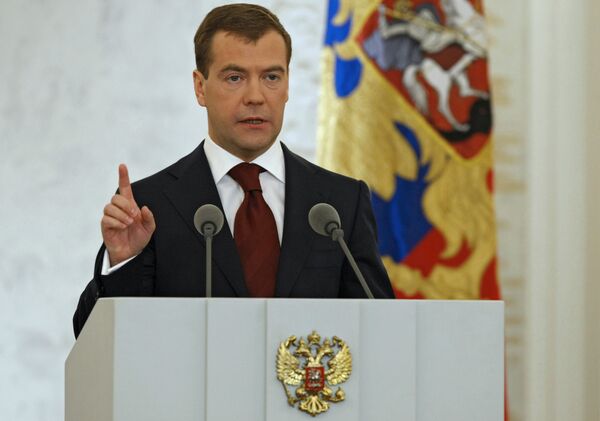President Dmitry Medvedev’s speech of November 12, 2009, has attracted a lot of interest. He spoke out for a “modernization” drive of the Russian economy. This was not the first speech on this topic, either by Medvedev or by Prime Minister Vladimir Putin, and this speech was an elaboration on his “Forward, Russia” article. Even so, delivered during the solemn “Address to the Nation,” it was a very significant event.
President Medvedev’s made “modernization” the spinal chord of his whole intervention. It is beyond doubt that the modernization issue is a vital one for Russia and certainly there are a lot of very positive things said in this speech. There is no doubt that production and exports of commodities have assumed too large a role in the economy. There is no doubt that the process of innovation, and the process of bringing innovation in the productive sphere, is not developed enough in today’s Russia.
There was too a focus on energy efficiency. The Russian economy is wasting energy on a giant scale, and the president rightly acknowledged this. The shift toward a true energy-efficiency strategy is an important one for Russia and, to the contrary to what is frequently thought, is certain to be much profitable. Energy wasted today could be sold tomorrow. By the same token, nobody can deny that corruption is widespread in Russia. Certainly, the time when the ugliest crimes were related to the economy is a past era. But corruption has been and still is a burden for Russia.
However, for all its positive content, there are many points unanswered and many questions left open.
First of all, the speech embarked onto the now fashionable opposition between “old” and “smart” industries. But things are much less clear-cut. There are considerable opportunities for innovation and high-technology processes in so-called “traditional” industries. In the production of steel or aluminium one can introduce modern and even high-tech technologies. The development of biotechnologies does not take place in isolation from agricultural production. Biotechnologies are extremely important in the development of new ways of processing food, but also in deriving new products from traditional ones like combination of alimentation and medicine. It is also obvious that in some industrial sectors, like carmaking and aerospace, the application of new technology is extremely important.
As a result, the necessary drive toward new, high value-added, technologies will not take place in isolation with the development of “traditional” industries, but much more complementarily with them. By the same token, it is not true that Russia’s industry has been stagnant in recent years. The rise in labour productivity is actually proof of the contrary. In the non-extractive industry, from 2003 to 2008 we have seen a rise of 148%. In construction, the increase was 169.6% and in transport and communications, 152.4%; as a whole, global economic productivity increased by nearly 145%. There has been progress outside the oil and gas industry.
However, the issue of the “new development model” is certainly a central one. President Medvedev rightly made it a core point of his speech. But he probably erred when he bluntly attacked state corporations. That their management can be improved is an obvious fact. But their privatization is not the solution.
First, one has to wonder why Russia has developed these state corporations after having privatized most of its industry in the previous decade. The reason is obvious. Private investors have been unable and/or unwilling to develop these industries. One can discuss the reason why, but it is a fact. The development of some key industries has to be done by the state or not at all.
Second, one has to reckon with a simple fact: in Russia only the state has the financial power to develop some sectors. We can understand why we ended up in this situation. People’s savings were destroyed twice in the 1990s. They could not support large investment funds. Savings are made only through export revenues, which are either channelled directly to the state budget through taxes or indirectly through state enterprises.
Third, the possibility of floating state corporations looks very remote today. Foreign investors will be much more interested by short-term investment. By the way, some of these corporations are far too strategic to be left to foreign investors.
What Russia is now facing is a form of the “Dutch Disease.” This explains why private investors are reluctant to invest outside export sectors. The main clue is the exchange rate of the ruble. In real terms, according to the Central Bank, it increased by nearly 50% from January 2005 till June 2008. The crisis brought a sharp devaluation, but not an enduring one. We are now again at more the 35% than the January 2005 value. In such a situation, it will be very difficult to develop industries other than in the raw-materials sector.
This overvaluation is directly the result of the liberalized currency exchange system, and a strong state sector is an attempt to compensate for this exports-induced overvaluation.
Actually, only a return to a current-account only convertibility system, with some exceptions for long-term foreign investment but also the creation of a special exchange sector for exporters, is able to support the modernization policy on the scale and scope envisioned by President Medvedev. But, he has been silent on this issue…
Jacques Sapir, Professor of economics and Director of the CEMI Research Center at EHESS (Paris)
The opinions expressed in this article are the author's and do not necessarily represent those of RIA Novosti.



